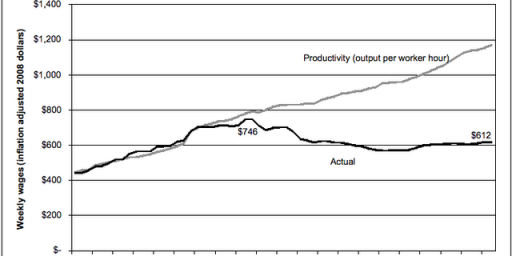Pricing Civilian Casualties
Andrew Sullivan cites without comment an AlterNet piece by The Nation‘s Tom Engelhardt comparing the compensation paid by Congress to the families of 9/11 victims to the “condolence payments” to host nation civilians accidentally killed as a result of our military action in Afghanistan and Iraq.
Using publicly available numbers, one can calculate that the U.S. government values an innocent civilian slaughtered by al-Qaeda terrorists on September 11, 2001 at $1.8 million, and an Iraqi civilian killed by Marines at $2,000.
Engelhardt is indignant by the very idea that the United States government has “offered the world an evaluation of what price slaughter should exact in the deaths of innocents.” Yet, unless we adopt the policy that compensation is insulting and we should merely extend official apologies and heartfelt condolences, some number has to be set. It may be callous to put a price on something that’s priceless (in the sense that few would willingly make the exchange were the death not a fait accompli) but we do it all the time.
Indeed, we have a fixed price on what families of American servicemen killed in wars receive:
- A tax-free Death Gratuity of $100,000
- Up to $2000 in burial expenses.
- A Veteran’s Death Pension that varies at a predetermined rate with family size and income.
- Proceeds from Servicemen’s Group Life Insurance up to $400,000 depending on nominal payments elected by the service member.
- Eligibility for various Surviving Spouse and Family Education Benefits.
- A Gold Star Lapel Button.
As to the comparison between the payments made to 9/11 survivors and those killed abroad, several points must be made.
I should note that I opposed from the outset any U.S. taxpayer compensation for the non-government-employee 9/11 victims. Their deaths were no more tragic and no more the responsibility of the federal government than any other murder victims. Their families should have been compensated by whatever savings, investments, and insurance provisions made ahead of time, just as is the case for the rest of us. The decision to pay them was both a knee-jerk response to an incredibly wrenching national tragedy and a calculated move to forestall a series of class action suits against wealthy victims of the attacks such as United Airlines and the owners of the World Trade Center that could have tied key sectors of the economy in knots.
As to the relative “value” represented by the payments, I find it far more outrageous that we decided that a stock broker working only for his own profit was worth several times that of an American Marine who risked his life fighting on the orders of his country than that we paid more for American deaths than Afghani or Iraqi deaths. Afghanistan has a GDP per capita of $800, Iraq $2900, and the United States $43,500. It stands to reason that the nominal amounts paid would vary widely.
We should not forget that it’s an act of remarkable generosity that we compensate innocent victims of war at all. It is not, after all, a common practice.






A trivial point perhaps, but in many aspects the operations in Iraq are more of an “occupation” than a “war”. In such cases, I believe there is indeed precedence for compensating innocent bystanders. Not to say we aren’t being generous – I agree that we are.
Culturally, the people of the middle east expect compensation in return for an error done to their family. The amount is not as important as the gesture.
But you’ve gotta admire Ann Friedman’s grasp of the appropriate snark:
An American soldier’s life: $250,000. An Iraqi civilian’s life: $500. Crushing terrorism and building democracy: Priceless.
That’s a tough sell. Afterall these civilians died in what was manifestly an attack on the United States itself, rather than as the victims of conventional crime. Now that may very well still not entitle them to compensation but I think we do have to consider that they are in some respects more akin to civilians killed in a war than conventional murder victims.